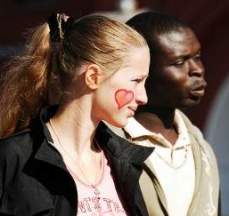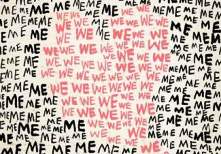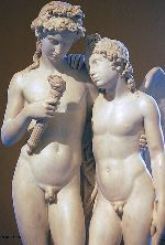|
Acts of Love
by Chris Hedges via ryall - TruthDig Monday, Feb 20 2012, 6:49am
international /
philosophy /
other press
[If you are returning to your senses Mr Hedges, this is an excellent re-Entry, welcome back!]
Love, the deepest human commitment, the force that defies empirical examination and yet is the defining and most glorious element in human life, the love between two people, between children and parents, between friends, between partners, reminds us of why we have been created for our brief sojourns on the planet. Those who cannot love—and I have seen these deformed human beings in the wars and conflicts I covered—are spiritually and emotionally dead. They affirm themselves through destruction, first of others and then, finally, of themselves. Those incapable of love [have] never lived.

“Hell,” Dostoevsky wrote, “is the inability to love.”
And yet, so much is written and said about love that at once diminishes its grandeur and trivializes its meaning. Dr. James Luther Adams, my ethics professor at Harvard Divinity School, cautioned all of us about preaching on love, reminding us that any examination of love had to include, as Erich Fromm pointed out in “Selfishness and Self-Love,” the unmasking of pseudo-love.
God is a verb rather than a noun. God is a process rather than an entity. There is some biblical justification for this. God, after all, answered Moses’ request for revelation with the words, “I AM WHO I AM.” This phrase is probably more accurately translated “I WILL BE WHAT I WILL BE.” God seems to be saying to Moses that the reality of the divine is an experience. God comes to us in the profound flashes of insight that cut through the darkness, in the hope that permits human beings to cope with inevitable despair and suffering, in the healing solidarity of kindness, compassion and self-sacrifice, especially when this compassion allows us to reach out to others, and not only others like us, but those defined by our communities as strangers, as outcasts. “I WILL BE WHAT I WILL BE.” This reality, the reality of the eternal, must be grounded in that which we cannot touch, see or define, in mystery, in a kind of faith in the ultimate worth of compassion, even when the reality of the world around us seems to belittle compassion as futile.
“The courage to be is rooted in the God who appears when God has disappeared in the anxiety of doubt,” wrote Paul Tillich.
There are few sanctuaries in war. Couples in love provide one. And it was to such couples that I consistently retreated. These couples repeatedly acted to save those branded as the enemy—Muslims trapped in Serb enclaves in Bosnia or dissidents hunted by the death squads in El Salvador. These rescuers did not act as individuals. Nechama Tec documented this peculiar reality when she studied Polish rescuers of Jews during World War II. Tec did not find any particular character traits or histories that led people to risk their lives for others, often for people they did not know, but she did find they almost always acted because their relationship explained to them the world around them. Love kept them grounded. These couples were not able to halt the destruction and violence around them. They were powerless. They could and often did themselves become victims. But it was with them, seated in a concrete hovel in a refugee camp in Gaza or around a wood stove on a winter night in the hills outside Sarajevo, that I found sanity and peace, that I was reminded of what it means to be human. It seemed it was only in such homes that I ever truly slept during war.
Love, when it is deep and sustained by two individuals, includes self-giving—often tremendous self-sacrifice—as well as desire. For the covenant of love recognizes both the fragility and sanctity of all human beings. It recognizes itself in the other. And it alone can save us, especially from ourselves.
Sigmund Freud divided the forces in human nature between the Eros instinct, the impulse within us that propels us to become close to others, to preserve and conserve, and the Thanatos, or death instinct, the impulse that works toward the annihilation of all living things, including ourselves. For Freud these forces were in eternal conflict. All human history, he argued, is a tug of war between these two instincts.
“The meaning of the evolution of civilization is no longer obscure to us,” Freud wrote in “Civilization and Its Discontents.” “It must present the struggle between Eros and Death, between the instinct of life and instinct of destruction, as it works itself out in the human species. This struggle is what all life essentially consists of.”
We are tempted, indeed in a consumer culture encouraged, to reduce life to a simple search for happiness. Happiness, however, withers if there is no meaning. The other temptation is to disavow the search for happiness in order to be faithful to that which provides meaning. But to live only for meaning—indifferent to all happiness—makes us fanatic, self-righteous and cold. It leaves us cut off from our own humanity and the humanity of others. We must hope for grace, for our lives to be sustained by moments of meaning and happiness, both equally worthy of human communion. And it is this grace, this love, which in our darkest moments allows us to endure.
Viktor Frankl in “Man’s Search for Meaning” grappled with Eros and Thanatos in the Auschwitz death camp. He recalled being on a work detail, freezing in the blast of the Polish winter, when he began to think about his wife, who had already been gassed by the Nazis although he did not know it at the time.
“A thought transfixed me,” he wrote, “for the first time in my life I saw the truth as it is set down by so many poets, proclaimed as the final wisdom by so many thinkers. The truth—that love is the ultimate and the highest goal to which man can aspire. Then I grasped the meaning of the greatest secret that human poetry and human thought and belief have to impart. The salvation of man is through love and in love.”
Love is an action, a difference we try to make in the world.
“We love our enemy when we love his or her ultimate meaning,” professor Adams told us. “We may have to struggle against what the enemy stands for; we may not feel a personal affinity or passion for him. Yet we are commanded for this person’s sake and for our own and for the sake of the destiny of creation, to love that which should unite us.”
To love that which should unite us requires us to believe there is something that connects us all, to know that at some level all of us love and want to be loved, to base all our actions on the sacred covenant of love, to know that love is an act of will, to refuse to exclude others because of personal difference or race or language or ethnicity or religion. It is easier to be indifferent. It is tempting to hate. Hate propels us to the lust for power, for control, to the Hobbesian nightmare of an eye for an eye and a tooth for a tooth. Hate is what people do when they are distressed, as many Americans are now, by uncertainty and fear. If you hate others they will soon hate or fear you. They will reject you. Your behavior assures it. And through hate you become sucked into the sham covenants of the nation, the tribe, and you begin to speak in the language of violence, the language of death.
Love is not selflessness. It is the giving of one’s best self, giving one’s highest self unto the world. It is finding true selfhood. Selflessness is martyrdom, dying for a cause. Selfhood is living for a cause. It is choosing to create good in the world. To love another as one loves oneself is to love the universal self that unites us all. If our body dies, it is the love that we have lived that will remain—what the religious understand as the soul—as the irreducible essence of life. It is the small, inconspicuous things we do that reveal the pity and beauty and ultimate power and mystery of human existence.
Vasily Grossman wrote in his masterpiece “Life and Fate”:
My faith has been tempered in Hell. My faith has emerged from the flames of the crematoria, from the concrete of the gas chamber. I have seen that it is not man who is impotent in the struggle against evil, but the power of evil that is impotent in the struggle against man. The powerlessness of kindness, of senseless kindness, is the secret of its immortality. It can never be conquered. The more stupid, the more senseless, the more helpless it may seem, the vaster it is. Evil is impotent before it. The prophets, religious leaders, reformers, social and political leaders are impotent before it. This dumb, blind love is man’s meaning. Human history is not the battle of good struggling to overcome evil. It is a battle fought by a great evil struggling to crush a small kernel of human kindness. But if what is human in human beings has not been destroyed even now, then evil will never conquer.
To survive as a human being is possible only through love. And, when Thanatos is ascendant, the instinct must be to reach out to those we love, to see in them all the divinity, pity and pathos of the human. And to recognize love in the lives of others, even those with whom we are in conflict—love that is like our own. It does not mean we will avoid suffering or death. It does not mean that we as distinct individuals will survive. But love, in its mystery, has its own power. It alone gives us meaning that endures. It alone allows us to embrace and cherish life. Love has the power both to resist in our nature what we know we must resist and to affirm what we know we must affirm.
© 2012 TruthDig LLC


http://www.truthdig.com/report/item/acts_of_love_20120219/
<< back to stories
|